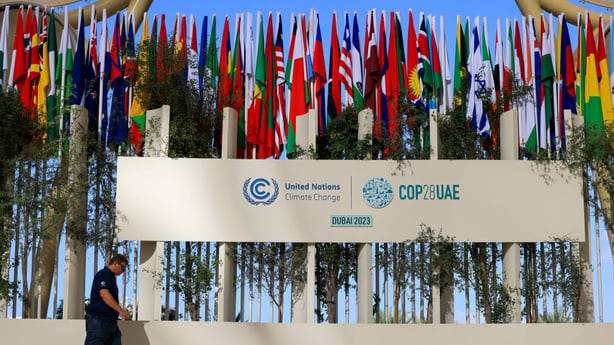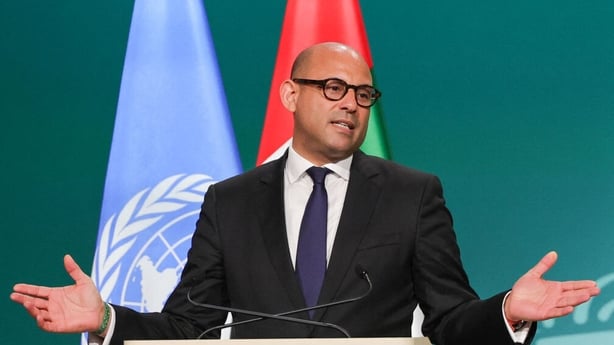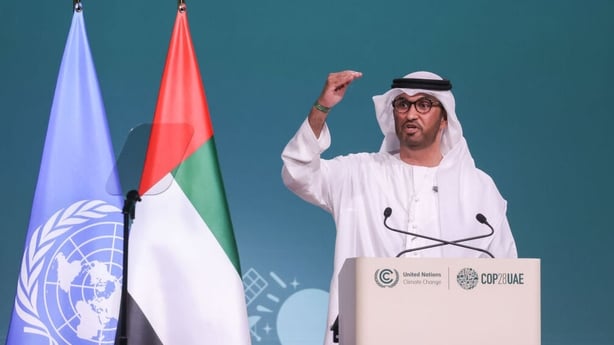The Secretary General of the United Nations has said that record global heating this year should send shivers down the spines of world leaders at the COP28 climate summit in Dubai and trigger them to act.
Antonio Guterres was speaking after the World Meteorological Organisation (WMO) confirmed on the first day of the climate summit that global temperatures have averaged 1.4C above pre-industrial levels so far this year, making it the warmest year on record.
Mr Guterres said that we are living through climate collapse in real time and the impact is devastating.
He said world leaders must go further and faster in protecting people from climate chaos by committing to triple renewable energy and doubling energy efficiency at COP28.
He also called for a commitment to phase out fossil fuels with a clear time frame aligned to the 1.5C warming limit.

Meanwhile, all countries participating at COP28 agreed to endorse and set up the new "loss-and-damage" (L&D) fund proposed at last year's UN climate negotiations at COP27 in Sharm El Sheikh in Egypt.
This is the first time ever that all 196 participating nations have agreed on a significant decision on the first day of COP negotiations.
This L&D fund will provide highly significant assistance to poorer and vulnerable countries in situations of climate disaster.
Germany and the United Arab Emirates (UAE) have already agreed to contribute $100 million (€91 million) each to kickstart the fund.
Other governments are also being encouraged to contribute.

It comes as negotiations got underway to ensure that the fossil fuel industry, international aviation and international shipping also make contributions to the fund.
The WMO had highlighted earlier that greenhouse gas levels are continuing to increase; that sea surface temperatures have reached record levels and sea level rise has accelerated to record levels; and that Antarctic sea ice is at a record low.
In a major new report launched at COP28, it confirmed the past nine years, 2015 to 2023, were the warmest on record.
It also warned that the warming El Niño event, which emerged during the Northern Hemisphere spring of 2023 and developed rapidly during summer, is likely to further fuel the heat in 2024 as El Niño typically has the greatest impact on global temperatures after it peaks.
Carbon dioxide levels are 50% higher than the pre-industrial era, trapping heat in the atmosphere.
The long lifetime of CO2 means that temperatures will continue to rise for many years to come.
Read more:
COP28: What to expect as summit gets under way in Dubai
Watch: Do you know what the global warming temperature threshold is?
Jargon Buster: What is the Global Stocktake?
Earlier, the UN Climate Change Executive Secretary Simon Stiell told COP28 delegates that the world has around six years before the planet's ability to cope with manmade emissions is exhausted and the rise in global temperatures exceeds 1.5C.
If during that time the world does not signal the terminal decline of the fossil fuel era as we know it, then we be welcoming our own terminal decline and choosing to pay with people’s lives, he said.
Mr Stiell also warned that if global leaders do not ensure a just transition to a low-carbon society and economy then it will not happen at all.
By 2025, he said all countries will have to deliver new promises and commitments about climate, or so-called Nationally Determined Contributions. He urged leaders to start working on them now.
Mr Stiell said in two years' time, every single commitment on climate finance, adaptation, and mitigation will have to be in line with a 1.5C world.

President of COP28 Dr Sultan Al Jaber, who is also the chief executive of the National Oil Company of the UAE, told COP28 delegates that the science has spoken, and the moment is now to find a new road with ambition that corrects course and accelerates climate action to 2030.
He said the global stocktake at COP28 through which the progress made by countries in delivering climate action promised is being examined, provides an opportunity to bring climate mitigation, climate adaptation, and climate finance together.
He said it is essential that no issue is left off the table by the negotiators at COP28 and that the role of fossil fuels needs to be included.
Dr Jaber said he knows there are strong views about the inclusion of language about fossil fuels and renewables but that the negotiators have the power to do something unprecedented.
He said that finance is a key factor in climate action and he wants COP28 to unlock finance so the so-called global south does not have to choose between their own economic development and climate action.
He highlighted that countries representing more than 85% of the world economy are behind the COP28 goal of tripling renewable energy capacity by 2030.
He added getting an agreement on the goal of double energy efficiency by 2030 is also being progressed.
The COP28 president said these factors, energy efficiency and renewable energy will help in the global transition away from unabated coal use.
We need your consent to load this rte-player contentWe use rte-player to manage extra content that can set cookies on your device and collect data about your activity. Please review their details and accept them to load the content.Manage Preferences
No oil deals at COP28 - Ryan
Minister for the Environment and Climate Eamon Ryan said there would be no oil deals at COP28.
He said that leaders have to ensure that the expansion of oil use does not happen and that there is agreement on the phasing out of fossil fuels.
"There won't be any oil deals struck at COP. Certainly nothing part of the international negotiations," Mr Ryan said.
He told RTÉ's Today with Claire Byrne that there is potential to secure consensus on the need for radical action to reduce fossil fuels.
Ireland and Europe, Mr Ryan said, could work with other countries in the developing world, where the impacts are being felt the most.
He said that a number of financial solutions are required and the money should come from a combination of sources.
It is not easy to get 200 countries to agree, the Green Party leader added, but the United Nations approach is the only option and "you can't do it on a bilateral basis".








